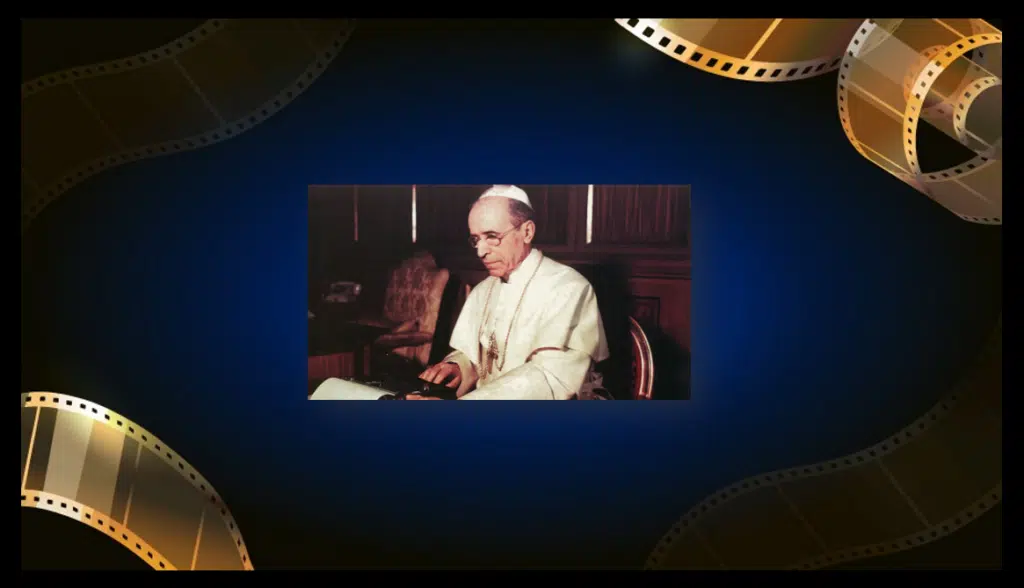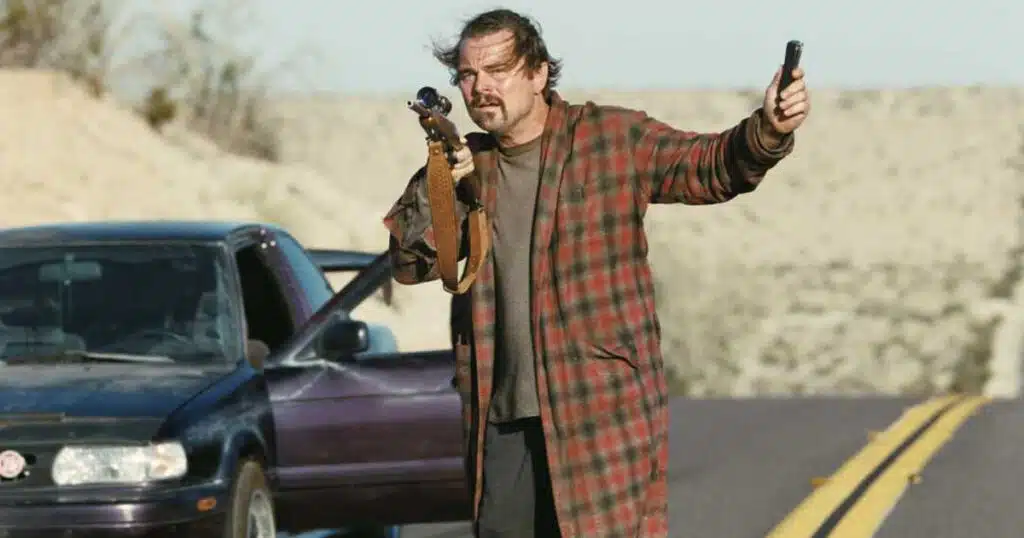
FINAL CUT: The Glitter of Hollywood and the Ghost of Pius XII
(This is Part II of II in a series—Part I laid the groundwork with Pius XI’s Vigilanti Cura. Both can be read as stand-alones).
Part I: “ROUGH CUT: Sean Combs, Babylon, and Two Popes That Tried to Warn Us”
Two decades after Pope Pius XI’s Vigilanti Cura, Pius XII took up the torch. In Miranda Prorsus, he didn’t simply echo his predecessor’s warnings—he expanded them.
By the 1950s, despite what black-and-white photos and retro nostalgia today might suggest, the moral rot hadn’t receded.
It had metastasized–and it was something another yet predecessor, the anti-Modernist Pius X, had warned would happen as his friends congratulated him on eradicating Modernism from the Church in the very early stages of the 20th century.
It hasn’t been eradicated, he said. It’s just gone underground for a while. It will come back even stronger.
He was torn up by it, apparently. He knew the enemy.
It hibernated and regrouped. And indeed, it came back with a vengeance. From Miranda Prorsus:
And so, as We ponder this serious matter with a fatherly concern that grows deeper from day to day, and reflect upon the good results that the Encyclical Vigilanti Cura has produced in the field of motion pictures during the past twenty years, We have resolved, in response to the entreaties of bishops and laymen engaged in these fields, to set down norms and instructions pertaining also to radio and television.
The warning was clear:
Some of these discoveries increase man’s strength and capacities; still others affect his intellectual life and reach the masses of the people either directly or through the agency of sound and pictures. These very easily transmit news, ideas, or instructions to those whose minds they nourish during moments of rest or relaxation. Among advances of this last type, the most notable in our era have been in the fields of motion pictures, radio, and television.
The Church welcomed these technological advances as soon as they came into use, but in her maternal concern and watchfulness she was also disposed to guard her children from every danger as they entered upon this age of progress….
It is not strange then that those who hold the Church’s highest authority have concerned themselves with this serious subject in order that they might provide for the eternal salvation of those who were “redeemed not with perishable things, with silver or gold. . ., but with the precious blood of Christ, as of a lamb without blemish” (1 Pet 1:18-19). They have examined carefully all the problems which motion pictures, radio, and television raise for Christians today….
We cannot approve the stand of those who claim and defend their freedom to depict and display whatever they please, despite the perfectly evident fact that great harm has come to souls in days past as a result of this attitude. For here the issue is not real freedom, which We have discussed above, but unchecked license to express oneself without regard for prudence, even though this be contrary to sound morals and liable to result in serious danger for souls.
Sound familiar? This is why even today’s “family-friendly” media must be scrutinized with spiritual eyes. The manipulation hasn’t ceased—it’s just grown smarter.
I wish I had paid heed to these teachings, or even been exposed to such a treasure trove, back over ten years ago when I was chasing a movie career as a screenwriter, and fell hook-line-and-sinker for the dark and tangled world New Orleans and its tax credits. I was duped, and I deserved it. As always, I write today as one bringing a caveat based on both pattern recognition and personal failure, not as someone who has done no wrong.
How do we think the Sean Combs of the world rose to power? How do we think the full extent of their actions remains hidden and may remain hidden for good? Do we think our judges or our legislators are going to do anything of real import about it?
They’re all in on it.
Who is everyone’s handlers? How do such people rise to such astronomical fame and power with such little in the way of talent or virtue?
Then comes a striking point of diagnosis from the document, one we’d do well to meditate on in the 21st century:
The remarkable progress made by modern technology in the fields of motion pictures, radio, and television have given rise to great benefits, and to just as great dangers. For these new means of communication are within the reach of almost everyone, and thus exercise a powerful influence over men’s minds. They can enlighten, ennoble, and adorn men’s minds, but they can also disfigure them with dark shadows, disgrace them with perversity, and expose them to unrestrained passions, according as the shows they offer present our senses with objects that are proper or improper.
Pius XII isn’t just talking about gore or nudity or the occasional “bad word” here and there, although that is certainly a crucial component of their spiritual attack. Those film ratings are camouflage. PG-13 and PG are just sin with a seatbelt. And G-rated is where the real indoctrination begins—because that’s where the gates are left wide open to the children.
This is subtle. It is about the anesthetizing effect of beautiful lies, the hypnotizing charm of deception that hides behind “cuteness.” He’s talking about psychological manipulation. He’s talking about narratives—which, when well packaged to the impressionable, are far more dangerous than any explicit scene.
Why?
Because they bypass the intellect.
They bypass the parental filter.
They make people think they’re going overboard or prude or being a “nutty” conspiracy theorist if they challenge something that seems innocent enough on the surface.
The kids don’t get those jokes anyway.
It all sounds a lot like what we see in today’s propaganda—not just from Hollywood, but from Netflix, Amazon, Disney+, and every other pipe of the consolidated entertainment-industrial complex. Many of the radio shows, the (fair and balanced!) news channels, of course the Mockingbird media, and yes, even the so-called conservative influencers are all a part of it too. It’s the same multifaceted tactic being used now to re-educate a generation not just on moral matters, but on political, spiritual, even eschatological ones.
They’re masters at “look there, not here.”
The kids are too young to understand what they’re seeing.
As a whole, long ago and despite the recent rally we’ve seen in the narrative war, we let the beast babysit our minds—and now our imaginations speak in autoplay. We handed over morality to the market and gave our imagination to the boogeyman under the bed. We thought “separation of church and state” meant keeping God out of the public square for fairness’s sake—and we never stopped to ask who would take his place. Looking back now, in my own life and in the conversations I have with others my age, it’s unmistakable. We see what the movies did to us. We see what the music formed in us. And we see just how blind we were to the tentacles encircling our hearts, our minds, our souls as we continued to feast on the bread and circuses.
And now we wonder why our kids can name every Marvel character but couldn’t tell you the difference between right and wrong if the Archangel Gabriel descended in full technicolor to tell them. Our entire society has become desensitized to Reality–capital R. Just ask yourself why you see so many people recording a tragedy on their phones instead of actually trying to help the victim out.
Read Chapter 8 of the Gospel of John. At least Jesus has given me a reason for my stupidity–we’re up against a most cunning snake for an enemy.
One that comes as an angel of light, because that’s what he and his minions once were.
Pius XII knew this wasn’t a peripheral matter that needed to be amended by parents or churches only. The spiritual catastrophe had gotten that out of hand.
Public authorities are bound, beyond all doubt, to oversee carefully these new means of communication. They should look on this matter not from a political point of view alone, but from that of public morals, whose sure foundation rests on the natural law. Which, as inspired words attest, is written in our hearts.
This vigilant attention of civil authorities cannot be regarded as an unjust restriction on civil liberty, since it is not directed to private persons, but to the whole of human society, by whom these means of communication are shared.
“We are aware.” We said on another occasion, “that public opinion is opposed today to intervention by public authority and would prefer regulation in this field that came from the community itself.” But rules and safeguards issuing from persons professionally engaged in these fields should not be set up in opposition to the serious duty of public authority, although they may support its measures and avert evils that can easily damage sound morals.
For this reason Our immediate Predecessor and We Ourselves have been pleased to praise all who, in compliance with the office entrusted to them, have laid down suitable safeguards and rules which do not prejudice the competency of civil authority. For We believe that these modern means of communication can make their contribution to the sound intellectual development of those who use them only if the Church, the state, and those professionally employed in them pool their resources in an organized way and cooperate with one another in achieving the desired goal. If the opposite occurs, if these arts, without fixed laws or moral safeguards, set out on a headlong and unimpeded course, they will certainly become a threat to real culture and a menace to sound morals.
Let that sink in.
The pope wasn’t just urging Catholics to skip the smut—he was calling on society to restructure the entire entertainment apparatus around truth, beauty, and moral clarity. He was calling public authorities to get involved. In his view, cinema was too potent a force to leave unguarded. It shaped not just taste, recreation, or leisure, but the bedrock of civilization itself.
That means the goal was never just personal purity. It was public, national, spiritual renewal.
In other words: Get off the sidelines. Turn off the bread and circuses and do the work, LeJeune. Pull together for something meaningful and do the work.
Now ask yourself—has that happened?
We long ago arrived at the wreckage—where our children speak in the voice of the beast who raised them, quote Disney before Daniel or Deuteronomy, and by their own hands help to shape a world where the most viral content is also the most spiritually empty.
I know all of this. I believe all of this. And yet my hypocrisy knows no bounds–I’ll still be tuned in to the colors and pageantry of football in the fall.
Still wondering why a man like Sean Combs could rise unchecked? Still wondering how his handlers—visible or not—could cover so much darkness with so much glitter? Still wondering what happened inside the Church to the point that it lost the moral high ground?
When Trump says, “We want movies made in America again,” the deeper question isn’t just economic.
It’s religious.
It’s about who controls the movie we’re watching, the movie we’re all a part of.
It’s about reality–Reality Himself.
We need to stop asking whether Hollywood’s collapse is a tragedy or a political issue. You can bet Trump himself believes that. The more important question is: how will we fill our role as American patriots intent on resurrecting some semblance of a moral order from the tomb?
Because while the lights haven’t gone down and the curtain hasn’t quite closed, the cameras are indeed rolling.
And so are our opportunities to really change–toward a most precipitous cliff.
—
May everyone named directly or referenced indirectly ask forgiveness and do penance for their sins against America and God. I fight this information war in the spirit of justice and love for the innocent, but I have been reminded of the need for mercy and prayers for our enemies. I am a sinner in need of redemption as well after all, for my sins are many. In the words of Jesus Christ himself, Lord forgive us all, for we know not what we do.



